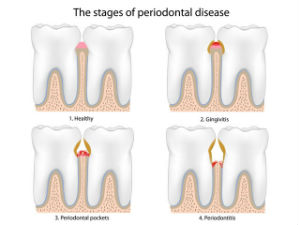Call: (702) 388-8979
Request AppointmentPeriodontal Treatment
The most common form of periodontal disease is gingivitis. Gingivitis is the inflammation and infection of the gums. There are many levels of gingivitis and if it’s not handled in a timely manner permanent damage can lead to permanent tissue and bone damage. With extended unattended periodontal disease, tissue and bone can be destroyed to the point where they no longer are able to support the teeth. This means teeth become loose and fall out.
The symptoms of periodontal disease are sore and bleeding gums. If teeth are not brushed and flossed regularly plaque builds up to cause trouble. The longer the plaque sits on the teeth and gums the more havoc the bacteria it is loaded with causes. The sticky plaque gets harder to remove the longer it sits. Hardened plaque is called tartar or calculus. Bacteria goes to town the longer they sit on your gums and teeth. They can emit toxins or acid that causes the gums to get infected and sore. The immune system will try to handle the infection by pumping blood to the area to battle the bacteria. Every time we brush in a hurry and miss areas the bacteria is released into our blood stream which can cause other health issues.

Regular checkups can keep periodontal issues monitored. Not only are the hard deposits removed, but any changes in the conditions of your mouth are noted and possibly treated. A dental probe is an instrument that will measure the gum and bone levels. Pockets can develop over time from the infections. Food and bacteria can pack down into the pockets causing more problems. The probing will help the dentist determine if the gingivitis has moved on to permanent periodontal disease. X-rays are also taken yearly to determine the bone levels around the teeth. Early intervention can be handled by your dentist with regular routine checkups.
Periodontal disease is to be taken seriously. Treatment starts with regular cleanings to keep the area free of bacteria that causes the issues to start with. Our certified dental hygienist will educate you on the proper techniques of brushing and flossing as home. Sometimes an extra cleaning here or there is needed for patients with higher mineral contents in their saliva. The calculus can build up faster for some and more frequent cleanings are easier on the patient. Antibacterial mouth washes can help keep the bacteria at bay. For weakened enamel due to long term exposure to the buildup, fluoride rinses might also be recommended. Teeth that are not in alignment can cause periodontal problems. Plaque builds quickly on crooked teeth. Orthodontics will help improve hygiene which can reduce periodontal problems.
 Prevention is through education. Let the staff at Silver State dental show you exactly what periodontal disease is and how to avoid it. With regular check ups and better hygiene periodontal disease doesn’t have to be an issue, but if it is, you want a dental team that will understand and take care of your periodontal dental needs.
Prevention is through education. Let the staff at Silver State dental show you exactly what periodontal disease is and how to avoid it. With regular check ups and better hygiene periodontal disease doesn’t have to be an issue, but if it is, you want a dental team that will understand and take care of your periodontal dental needs.
Depending on the severity of the disease, we recommend that you initially start with a deep cleaning and continue with periodontal maintenance every 3 months until we ascertain your gums have healed properly.
A regular cleaning takes about 30 minutes, while a deep cleaning, done by our certified dental hygienist, usually takes 1- 1 ½ hours for 2 quadrants.
